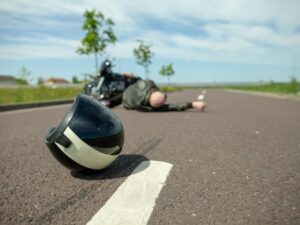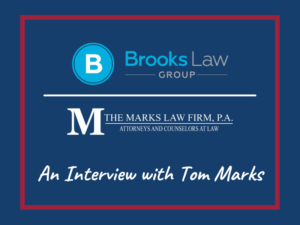Motorcycle accidents have a pronounced impact on the lives of thousands of people in Florida each year. According to the Florida Department of Highway Safety and Motor Vehicles, there were 8,895 motorcycle accidents statewide in a single recent year, resulting in 550 deaths and 2,072 incapacitating injuries.
Because motorcycles are smaller, more difficult to see, and offer less protection than cars, riders are more likely to suffer severe or potentially fatal injuries when they’re involved in a crash. A motorcycle accident can have long-term and possibly lifelong financial and physical repercussions for injured victims.
If you were seriously hurt in a motorcycle accident in Florida, you shouldn’t have to bear the burden of rebuilding your life on your own. The motorcycle accident lawyers at Brooks Law Group can help you seek fair compensation for your injuries.
Since 1992, our legal team has secured millions of dollars in compensation for people who have been harmed in accidents throughout Central Florida. Get a free consultation today by calling one of our four offices in Tampa, Winter Haven, Auburndale, or Lakeland. You can also use our online chat service or visit our contact page to get in touch.
Common Types of Motorcycle Accident Injuries
Some of the most common injuries that happen in Florida motorcycle accidents include:
- Spinal cord injuries/paralysis: The impact of a motorcycle accident can damage your vertebrae and the discs between vertebrae that support your spine. If spinal trauma damages or severs the spinal cord, accident victims may suffer from temporary or permanent paralysis. Paralysis can cause complications that damage all body systems and worsen with time, sometimes resulting in premature death.
- Whiplash: The forceful impact of a motorcycle accident may cause the head to snap back and forth in a whip-like motion, resulting in a neck injury called whiplash. The sudden movement can severely strain the bones, muscles, nerves, and connective tissues in the neck and upper back. Whiplash is a common injury in rear-end motorcycle accidents and can cause chronic pain and reduced range of motion.
- Traumatic brain injury (TBI): A severe blow to the head, whether it’s the result of a direct impact in an accident or landing hard after being ejected from the motorcycle, can severely damage the brain. Trauma can occur even if the skull is not broken. Head injuries can cause internal bruising, bleeding, and swelling within the brain that can be deadly without swift medical treatment. TBIs can lead to devastating disabilities, a decline in cognitive function, loss of movement, memory and personality changes, and other disabling injuries.
- Back injuries: Motorcycle accidents can cause severe damage to the bones, muscles, and other tissues in your back, causing intense pain and limiting your ability to move.
- Musculoskeletal injuries: Damage to the bones and connective tissues can result in sprains and strains that can significantly impact your ability to move to work and participate in other daily activities.
- Road rash: Sliding or rolling along a road surface after being thrown from a motorcycle may lead to road rash, a painful condition resulting in infections, scarring, and disfigurement.
- Burns: Hot road surfaces, warm metal, and other heat sources can lead to severe burns after a motorcycle collision.
- Broken bones: It’s not uncommon for motorcycle accident victims to break multiple bones after an accident, especially in high-speed crashes. Without proper treatment, fractures may not heal properly, requiring surgery, long-term pain, and other problems.
- Death: Motorcycle accidents tend to have a higher fatality rate than car accidents because motorcyclists are less protected in the event of a crash. The more catastrophic the injury, the greater the risk of dying from a motorcycle accident.
For a free legal consultation, call (800) 529-3030
Can I Get Compensation for My Injuries?
 Under Florida’s current no-fault insurance system, motorcycles are not considered “motor vehicles.” This means that even if you have Personal Injury Protection (PIP) benefits for another vehicle, you cannot use these benefits to cover your injuries after a motorcycle accident.
Under Florida’s current no-fault insurance system, motorcycles are not considered “motor vehicles.” This means that even if you have Personal Injury Protection (PIP) benefits for another vehicle, you cannot use these benefits to cover your injuries after a motorcycle accident.
Assuming the crash is not your fault, you will need to file an insurance claim with the at-fault party’s insurance company. If this fails, you can file a personal injury lawsuit to pursue compensation for your injuries.
By filing an injury claim or lawsuit against the driver who injured you, you can potentially claim compensation for:
- Past, current, and anticipated future medical bills
- Missed wages
- Reduced earning capacity, if you are unable to work
- Pain and suffering
- Emotional anguish
- Property damage
What Should I Do If I Was Injured in a Motorcycle Accident?
Here are the steps to follow if you’ve been hurt in a motorcycle accident:
- If you aren’t taken directly to a hospital from the scene of the crash, seek medical attention as soon as possible.
- Follow your doctor’s instructions precisely. Otherwise, your claim could be denied, or you might not be able to recover the full amount you deserve for your injuries.
- Hold on to all your bills, medical records, and any evidence you saved from the crash scene (e.g., photos, videos, witness statements, police accident reports, etc.)
- Don’t mention your accident on social media.
- Don’t talk to any insurance companies until you’ve spoken to an attorney.
- Talk to a qualified motorcycle accident lawyer to learn about your rights to compensation.
Click to contact our personal injury lawyers today
Contact a Florida Motorcycle Accident Lawyer Today
The Florida motorcycle accident lawyers at Brooks Law Group are dedicated to helping victims get their lives back after a crash. While you focus on healing, we’ll be working hard to secure maximum compensation for your medical bills, lost wages, and other expenses. Get a free case review by calling one of our four Florida offices or completing our contact form today.
Call or text (800) 529-3030 or complete a Free Case Evaluation form




